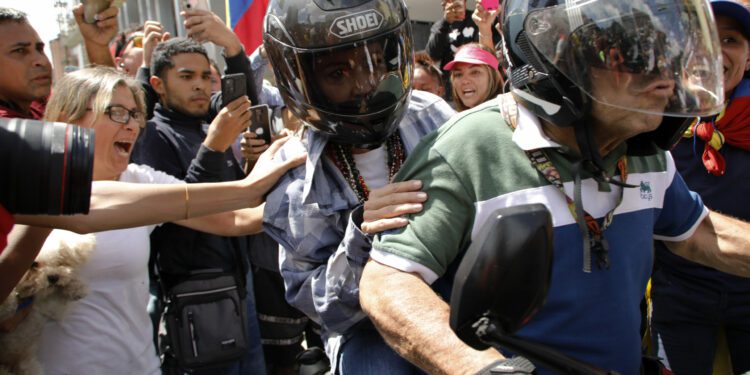Venezuelans at home and around the world tomorrow plan demonstrations to repudiate the Cuban-trained dictator of Venezuela, Nicolás Maduro. Three weeks ago, by most accounts, he stole the presidential election.
With 2,400 detained protesters already filling two reopened maximum security prisons, Venezuela’s military counterintelligence service is sending an Instagram warning to anyone planning to protest tomorrow. Publicizing the agency’s “Tun Tun” or “Knock Knock” raids, a video shows last week’s arrest of protest organizer María Oropeza.
The soundtrack is from the 1984 slasher movie in which Freddy Krueger attacks children while lyrics warn: “One, two, Freddy’s coming for you. Three, four, better lock your door.” In Caracas’ working class neighborhoods, once bastions of support for Mr. Maduro, secret police spray paint black Xes on facades of houses where dissidents live.
On national television, Mr. Maduro calls Edmundo González, the opposition candidate who apparently won almost two thirds of the vote, “a war criminal.” He routinely calls María Corina Machado, the organizer of tomorrow’s protests, “a terrorist.”
“I demand from all the powers of state greater speed, greater efficiency, and an iron fist against crime, against violence, against hate crimes,” Mr. Maduro railed Monday. A local human rights group, Provea, says that 23 persons have died in the protests.
Yesterday, Venezuela’s government-controlled National Assembly unanimously passed a bill allowing the government to regulate more tightly non-governmental organizations. Brazil’s mediation envoy, Celso Amorim, returned from Caracas last week warning that a “very serious conflict” is possible. He told Brazil’s GloboNews: “I don’t want to use the expression civil war — but I feel very afraid.”
To hinder communications, Mr. Maduro ordered Venezuelans to delete WhatsApp, a major tool of opposition communication. He then banned X for 10 days because the owner, Elon Musk called him a “dictator” and a “clown.”
With the dictator showing a hard line, few Venezuelans put much stock in a Brazilian proposal for a coalition government, a Colombian proposal for the government and opposition to alternate terms in power, American feelers about amnesty in return for exile, or a Brazilian-American proposal for a new election.
The Biden administration quickly backed away from that last one, but not before Ms. Machado told Argentinian and Chilean reporters: “The election already happened.” She added: “Maduro must be made to know that the cost of his staying grows with each day that passes.”
Mr. Maduro’s political advisors are Cuban communists, a group that has held power for 65 years. Venezuela’s leader shows no intention of surrendering power during the five month hiatus before his January 10 inauguration for a third 6-year term. When Panama’s newly elected president, José Raúl Mulino, offered him asylum, the Venezuelan leader accused him of getting “carried away by the gringos.” Turning to reporters, he added: “I will try to learn your name, President of Panama, but whoever messes with Venezuela runs aground.”
Instead, leaders of other countries of the Americas, to Canada from Chile, are bracing for another wave of Venezuelan emigrants. During the Maduro decade, economic mismanagement was so acute that one quarter of the population — 7.7 million people — walked out. Once a rising middle class nation, Venezuela is now ranked toward the bottom in Latin America when measured socio-economic indicators.
This economic catastrophe comes to a country with the largest oil reserves in the world. In a stunning fall from grace, Venezuelans accounted for 60 percent of migrants trudging last year through the Darién Gap, a 60-mile stretch of jungle on the Colombia-Panama border. About 800,000 Venezuelans made it to the United States, making them the fastest growing Latino nationality.
With the US election November 5, Venezuelan migrants may find it increasingly difficult to open doors this fall in the United States — and across the Americas. Countries that had expected many Venezuelans to return home for a González presidency now brace for a new Venezuelan exodus.
In Colombia, first port of call for almost all Venezuelans leaving by land, visa restrictions are tightening. A generous visitor visa program expired last November, and the government is struggling to muster votes to renew it in congress.
Half a century ago, Chile abandoned its experiment with Marxism. Today, free-market Chile has a per capita income four times that of socialist Venezuela. Flooded with Venezuelan migrants, Chile last year sent its military to patrol its northern borders with Peru and Bolivia. This year, Chile’s interior ministry is buying thermal cameras to track illegal crossings across its northern desert. In 2021, an angry mob burned down a Venezuelan tent encampment in 2021.
With the half a million Venezuelans migrating to Chile came Venezuela’s largest criminal gang, Tren de Aragua. Homicides doubled in 2022 and local attitudes soured. According to pollster Cadem, the share of Chileans opposed to immigration more than doubled in five years, hitting 77 percent in 2023 from 31 percent in 2018. In a poll taken after Venezuela’s botched July 28 presidential election, 61 percent of Chilean respondents opposed more immigrants from Venezuela.
Chile has debated different approaches. A proposal to jail illegal immigrants for up to 18 months did not gain traction in congress. Officials have proposed a regional solution similar to Europe’s where countries would be allotted quotas to take in Venezuelans.
In six weeks, Mr. Maduro could get a visit from a world leader who bolsters his hold on power by exporting unhappy citizens. Russia was one of the first countries to congratulate Mr. Maduro on his “reelection.” Mexico’s president-elect, Claudia Sheinbaum, has invited Vladimir Putin to Mexico City for her October 1 inauguration. Mexico’s President, a Sheinbaum ally, says Mexico cannot enforce an international arrest warrant against the Russian President.
“We can’t do that,” President Andres Manuel Lopez Obrador told reporters last week. “It’s not up to us.”
Source link : http://www.bing.com/news/apiclick.aspx?ref=FexRss&aid=&tid=66bfc674c3524f28bbf93db8e362a38d&url=https%3A%2F%2Fwww.nysun.com%2Farticle%2Fknock-knock-guess-who-will-show-up-at-americas-door-after-venezuelas-stolen-election&c=12387628540627654966&mkt=en-us
Author :
Publish date : 2024-08-15 22:56:00
Copyright for syndicated content belongs to the linked Source.





